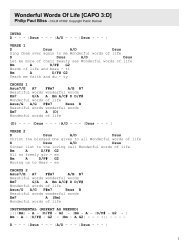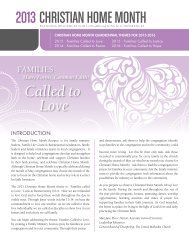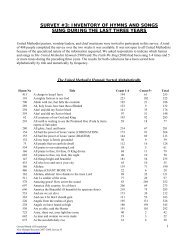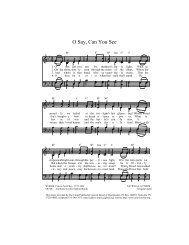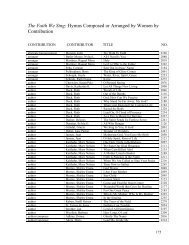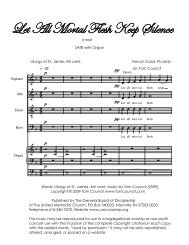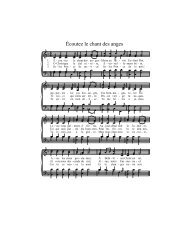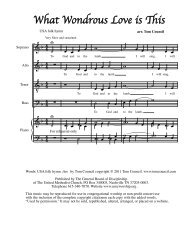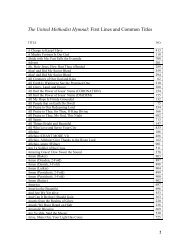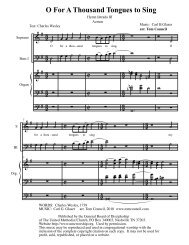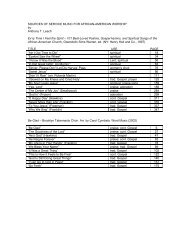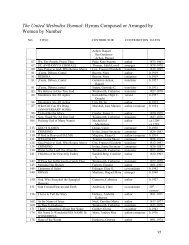Leader's Guide for Accountable Discipleship: Living in God's ...
Leader's Guide for Accountable Discipleship: Living in God's ...
Leader's Guide for Accountable Discipleship: Living in God's ...
Create successful ePaper yourself
Turn your PDF publications into a flip-book with our unique Google optimized e-Paper software.
<strong>Accountable</strong> <strong>Discipleship</strong>:<br />
<strong>Liv<strong>in</strong>g</strong> <strong>in</strong> God’s Household<br />
Leader’s <strong>Guide</strong><br />
by Steven W. Manskar<br />
Copyright © 2002 The General Board of <strong>Discipleship</strong>. All rights<br />
reserved. All or part of this leader’s guide may be repr<strong>in</strong>ted <strong>for</strong><br />
use with <strong>Accountable</strong> <strong>Discipleship</strong>: <strong>Liv<strong>in</strong>g</strong> <strong>in</strong> God’s Household,<br />
by Steven W. Manskar (<strong>Discipleship</strong> Resources, 2000,<br />
ISBN 0-88177-339-5), as long as the copyright notice appears on<br />
each page.
Contents<br />
Introduction .............................................................................. 1<br />
Session 1 .................................................................................... 6<br />
A Prayer From John Wesley .............................................. 8<br />
“The Household of God”.................................................... 9<br />
Session 2 .................................................................................... 10<br />
A Prayer From John Wesley .............................................. 13<br />
“From The Character of a Methodist by John Wesley” .... 14<br />
Session 3 .................................................................................... 15<br />
A Prayer From John Wesley .............................................. 18<br />
“From Wesley’s Preface to the Collection of Sermons” .... 19<br />
Session 4 .................................................................................... 20<br />
A Prayer From John Wesley .............................................. 23<br />
“Do<strong>in</strong>g Theology” .............................................................. 24<br />
Session 5 .................................................................................... 25<br />
A Prayer From John Wesley .............................................. 27<br />
“And Can It Be that I Should Ga<strong>in</strong>” .................................. 28<br />
Session 6 .................................................................................... 29<br />
A Prayer From John Wesley .............................................. 32<br />
“Love Div<strong>in</strong>e, All Loves Excell<strong>in</strong>g” .................................... 33
Introduction<br />
<strong>Accountable</strong> <strong>Discipleship</strong>: <strong>Liv<strong>in</strong>g</strong> <strong>in</strong> God’s Household is a book about pastoral leadership <strong>in</strong> the<br />
Wesleyan tradition. Pastoral leadership is the m<strong>in</strong>istry of car<strong>in</strong>g <strong>for</strong> the household of God. Both the laity<br />
and clergy are called to this m<strong>in</strong>istry. Those who read and study this book will be <strong>in</strong>vited to discover their<br />
own m<strong>in</strong>istry as pastoral leaders.<br />
All who follow Jesus Christ and seek to obey his teach<strong>in</strong>gs to “Love the Lord your God with all your<br />
heart, all your soul, and all your m<strong>in</strong>d, and love your neighbor as yourself” have the potential to be a pastoral<br />
leader <strong>for</strong> their congregation. They are pastoral leaders because others see and experience the grace of<br />
Jesus Christ through their lives. They are spiritual, servant leaders who follow the example of Jesus. These<br />
are ord<strong>in</strong>ary people. They are laity and clergy. They are people like you.<br />
Biblical Foundation<br />
The Bible offers numerous examples of leadership that could provide a foundation upon which to<br />
build this study. Leaders such as Abraham, Moses, Deborah, Samuel, David, Mary, Jesus, Peter, and Paul<br />
each share common characteristics while also rema<strong>in</strong><strong>in</strong>g very dist<strong>in</strong>ct <strong>in</strong> personality and context. These biblical<br />
figures are part of the Jewish/Christian heritage and serve as models of leadership <strong>for</strong> the church today.<br />
However, we must also acknowledge that some leaders are better examples than others when we are<br />
look<strong>in</strong>g <strong>for</strong> models to emulate <strong>in</strong> the church. With this <strong>in</strong> m<strong>in</strong>d, this study will focus on Jesus’ leadership.<br />
His life and m<strong>in</strong>istry exhibits important characteristics that will <strong>in</strong><strong>for</strong>m the theories underly<strong>in</strong>g this study.<br />
Jesus experienced an <strong>in</strong>timate relationship with God. He emerged from an environment of poverty and<br />
focused his energies on br<strong>in</strong>g<strong>in</strong>g freedom to people suffer<strong>in</strong>g <strong>in</strong> slavery and oppression. He was often misunderstood<br />
by the people he served. And he shared power and authority with others. Jesus represents the<br />
predom<strong>in</strong>ant leadership paradigm <strong>in</strong> the Bible.<br />
What is the paradigm <strong>for</strong> leadership <strong>in</strong> the Bible? How does Jesus represent this biblical pattern?<br />
The biblical model <strong>for</strong> leadership has at least four essential elements. I say this model is predom<strong>in</strong>ant<br />
<strong>in</strong> Scripture by virtue of its presence <strong>in</strong> the central figures of Moses and Jesus. These four elements are:<br />
1. God is relational. “God is not only free but has chosen to use that freedom to enter <strong>in</strong>to relationship.<br />
Freedom alone could result <strong>in</strong> the picture of an aloof, uncar<strong>in</strong>g God. But the Exodus story is of a God<br />
who freely chooses to respond to human need.” 1 God works through people whose personality and motivational<br />
orientation are open to grace. These are people who are will<strong>in</strong>g to listen and discern. They understand<br />
that their power does not come from with<strong>in</strong> themselves but from their creator. And these people are will<strong>in</strong>g<br />
to make themselves so available to God that this power flows through them <strong>in</strong> service with others. The<br />
power that flows from God to and through them is grace. Leadership, as it exists <strong>in</strong> the world of the Bible,<br />
has its beg<strong>in</strong>n<strong>in</strong>g and end <strong>in</strong> God and God’s grace. Those <strong>in</strong>dividuals whose personality is oriented toward<br />
love of God, neighbor, and self are likely to become leaders.<br />
1 Birch, Bruce C. Let Justice Roll Down: The Old Testament, Ethics, and Christian Life<br />
(Louisville, Kentucky: Westm<strong>in</strong>ster John Knox Press, 1991), 119.<br />
ACCOUNTABLE DISCIPLESHIP: LIVING IN GOD’S HOUSEHOLD<br />
Leader’s <strong>Guide</strong><br />
1<br />
Copyright © 2002 The General Board of <strong>Discipleship</strong>
2. Biblical leadership is egalitarian. It does not seek the build<strong>in</strong>g up of self. Leaders grounded <strong>in</strong><br />
Scripture do not strive to get and hold onto power <strong>in</strong> order to ga<strong>in</strong> wealth, prestige, and position <strong>for</strong> themselves.<br />
Rather, they seek the common good. In other words, biblical leaders are prophetic. “The prophetic<br />
ethic … seeks a societal order that values the worth of every person be<strong>for</strong>e God. There<strong>for</strong>e, when any member<br />
of the community is denied the resources of full life and worth, the entire community is dim<strong>in</strong>ished and<br />
broken.” 1 Leaders are channels of grace. They work to ensure that everyone has what they need to live and<br />
participate fully <strong>in</strong> the life of the community. S<strong>in</strong>ce all people are equal <strong>in</strong> the eyes of God, leaders cannot<br />
set themselves above those whom they lead and serve.<br />
3. Biblical leaders share power and responsibility with others. They lead from the center. Biblical<br />
leadership is not hierarchical because its power is not derived from dom<strong>in</strong>ation but from partnership with<br />
God and with neighbor. This <strong>for</strong>m of leadership is not leadership “over.” It is leadership “with.” The<br />
Hebrew word that best describes this characteristic is hesed. Most often translated as “steadfast love,” hesed<br />
characterizes God’s relationship with Israel and, <strong>in</strong> Jesus Christ, with all the world (God’s household). “It is<br />
a difficult concept to capture <strong>in</strong> any one English word and has been represented variously by ‘mercy,’ ‘grace,’<br />
‘loyalty,’ ‘goodness,’ ‘lov<strong>in</strong>g-k<strong>in</strong>dness,’ and ‘compassion.’ This alone witnesses to the breadth of div<strong>in</strong>e activity<br />
encompassed <strong>in</strong> the term.” 2 Leaders liv<strong>in</strong>g <strong>in</strong> God’s household reflect this trait <strong>in</strong> their lives and work.<br />
Such leaders understand that they cannot do everyth<strong>in</strong>g themselves. They share the responsibilities of leadership<br />
with others who are will<strong>in</strong>g to accept them. In so do<strong>in</strong>g, these leaders build up the community <strong>in</strong>to<br />
the image and likeness of God.<br />
4. Biblical leaders focus their energies on a clearly def<strong>in</strong>ed vision and mission. Their leadership has<br />
purpose and direction because they are aligned with God’s promised future. “Trust <strong>in</strong> God’s promised future<br />
requires leadership <strong>in</strong> ways expressive of that trust and <strong>in</strong> confidence that God’s purposes will be served. It<br />
requires <strong>in</strong>volvement <strong>in</strong> the confrontations and struggles that lead to the freedom God has planned.” 3 The<br />
source of the leaders’ clear vision and mission is their trust <strong>in</strong> God and God’s promised future of salvation.<br />
Because of this trust, also known as faith, they know where they are go<strong>in</strong>g and they know how to get there.<br />
The leaders’ personal vision and mission are <strong>in</strong>tertw<strong>in</strong>ed with the vision and mission of the community.<br />
With the guidance of grace, they are able to articulate the mission and vision <strong>for</strong> the community and<br />
then focus all their energies upon the realization of that mission and vision.<br />
Jesus embodied these four elements of biblical leadership. While there may be additional characteristics<br />
of faithful leadership, we will limit our study to these four. Let us look at passages that attest to these<br />
leadership traits <strong>in</strong> the life of Jesus.<br />
Jesus exhibited the four essential elements of biblical leadership. He was a man of humble orig<strong>in</strong>s.<br />
The son of a Jewish carpenter from Nazareth, Jesus was a man who made his liv<strong>in</strong>g with his hands. His spirit<br />
was open to God’s Spirit. Of course, given the church’s belief that Jesus was God <strong>in</strong>carnate — fully div<strong>in</strong>e<br />
and fully human — Jesus is a unique case. Yet the Scriptures tell us that he struggled to discern his call<br />
1 Birch, Bruce C. Let Justice Roll Down: The Old Testament, Ethics, and Christian Life<br />
(Louisville, Kentucky: Westm<strong>in</strong>ster John Knox Press, 1991), 269.<br />
2 Ibid, 152.<br />
3 Ibid, 127.<br />
ACCOUNTABLE DISCIPLESHIP: LIVING IN GOD’S HOUSEHOLD<br />
Leader’s <strong>Guide</strong><br />
2<br />
Copyright © 2002 The General Board of <strong>Discipleship</strong>
(Matthew 4:1-11; Mark 1:12-13; Luke 4:1-13). The accounts of his baptism by John (Matthew 3:13-17;<br />
Mark 1:9-11; Luke 3:21-22) and of his spend<strong>in</strong>g <strong>for</strong>ty days and nights of fast<strong>in</strong>g and prayer <strong>in</strong> the wilderness<br />
(Matthew 4:1-11; Mark 1:12-13; Luke 4:1-13) are evidence of Jesus’ struggle with his identity and mission.<br />
Because of Jesus’ will<strong>in</strong>gness to engage God <strong>in</strong> this struggle, God was able to help him discover who and<br />
whose he was. Jesus lived his life <strong>in</strong> <strong>in</strong>timate relationship with God.<br />
Jesus was an egalitarian leader. He cared <strong>for</strong> all people, rich and poor (Matthew 14:13-21). And his<br />
special concern was directed toward those who were the least, the last, and the lost (Luke 4:18-19). He was<br />
a prophet who strove <strong>for</strong> the k<strong>in</strong>gdom of God. His teach<strong>in</strong>g and preach<strong>in</strong>g pa<strong>in</strong>ted a picture of the k<strong>in</strong>gdom<br />
of God (Matthew 5:1-12). Jesus gave himself <strong>for</strong> the salvation of the world.<br />
Jesus shared himself and his power with others. The first th<strong>in</strong>g he did as he began his public m<strong>in</strong>istry<br />
was to gather a community of disciples around him. He realized that his mission was too big and too important<br />
<strong>for</strong> him to attempt to complete it alone. He knew he couldn’t do it all by himself. Jesus called the disciples and<br />
equipped them to carry on his m<strong>in</strong>istry after he was gone. Jesus trusted that God would cont<strong>in</strong>ue the work of<br />
br<strong>in</strong>g<strong>in</strong>g the good news of the k<strong>in</strong>gdom to the world through the life and witness of the community <strong>for</strong>med<br />
around him.<br />
Jesus had a clearly def<strong>in</strong>ed vision and mission that was the focus of his life. His vision was the k<strong>in</strong>gdom<br />
of God (Matthew 5:1-12, Luke 4:16-18) and his mission was bear<strong>in</strong>g witness to that good news to the<br />
world (Matthew 28:19-20). Everyth<strong>in</strong>g Jesus did was focused upon the fulfillment of his vision and mission.<br />
Jesus’ life provides examples of the leadership paradigm presented by the Bible. Exam<strong>in</strong><strong>in</strong>g his life,<br />
vision, and mission will give us some clues to the paradigm of faithful leadership the church needs to foster<br />
as it seeks faithful, effective pastoral leaders <strong>for</strong> the future.<br />
Theological Foundation<br />
The theological foundation <strong>for</strong> this study will be the Wesleyan way of salvation by grace through<br />
faith. Grace calls people <strong>in</strong>to relationship with Christ, and that relationship is lived out through the community<br />
of the church. Christ calls people <strong>in</strong>to community through baptism. God also calls and equips leaders<br />
who are responsible <strong>for</strong> teach<strong>in</strong>g and mentor<strong>in</strong>g those who are new to the faith and <strong>for</strong> keep<strong>in</strong>g the community<br />
focused on its vision and mission. This leadership emerges from the community as women, men, and<br />
youth answer God’s call and claim upon their lives.<br />
The theological focus of this study will be the Wesleyan doctr<strong>in</strong>e of sanctification. This doctr<strong>in</strong>e is useful<br />
<strong>for</strong> understand<strong>in</strong>g the nature of Christian leadership because its dynamic is that of a process of growth and<br />
maturation. Harald L<strong>in</strong>dström says, “The idea of a gradual advance <strong>in</strong> sanctification is thus a typical feature<br />
of Wesley’s view of salvation.” 1 Randy Maddox adds, “Wesley’s ‘holy tempers’ (habitual dispositions) would<br />
not be simply <strong>in</strong>fused by God’s sanctify<strong>in</strong>g grace <strong>in</strong> <strong>in</strong>stantaneous completeness; they would be develop<strong>in</strong>g<br />
realities, strengthened and shaped by our responsible participation <strong>in</strong> the empower<strong>in</strong>g grace of God. The<br />
dimension of a gradual ‘growth <strong>in</strong> grace’ would be <strong>in</strong>tegral to sanctification.” 2 Wesley believed that the nature<br />
of sanctify<strong>in</strong>g grace was such that God empowered human be<strong>in</strong>gs to cooperate with God and participate <strong>in</strong><br />
1 L<strong>in</strong>dström, Harald. Wesley & Sanctification (Nappanee, Indiana: Francis Asbury Press, 1980), 120.<br />
2 Maddox, Randy L. Responsible Grace: John Wesley’s Practical Theology (Nashville: Ab<strong>in</strong>gdon Press, 1994), 179.<br />
ACCOUNTABLE DISCIPLESHIP: LIVING IN GOD’S HOUSEHOLD<br />
Leader’s <strong>Guide</strong><br />
3<br />
Copyright © 2002 The General Board of <strong>Discipleship</strong>
their own salvation. Hence, sanctification is a process that happens over time as persons grow <strong>in</strong> grace and<br />
love <strong>for</strong> God and their neighbor. This growth <strong>in</strong> grace is not unlike the stages of human development. 1 Those<br />
who have made progress become leaders, by the nature of their growth, <strong>for</strong> those who are “younger” <strong>in</strong> faith.<br />
Sanctification beg<strong>in</strong>s at the moment of justification and new birth. Just like a newborn <strong>in</strong>fant, the<br />
“born aga<strong>in</strong>” Christian beg<strong>in</strong>s grow<strong>in</strong>g <strong>in</strong> a new life <strong>in</strong> Christ. Growth comes through watch<strong>in</strong>g and learn<strong>in</strong>g<br />
from others with more years of experience <strong>in</strong> discipleship, and via Bible study and learn<strong>in</strong>g with those<br />
who have spent much time with the Scriptures. As these “newborn” Christians learn about and practice the<br />
means of grace, they grow and mature. Some of them even answer the call to leadership.<br />
Sanctification br<strong>in</strong>gs about a real change <strong>in</strong> the character and life of human be<strong>in</strong>gs and their relationship<br />
with God. It is a process of draw<strong>in</strong>g closer and closer to God. It is the way by which the image of God<br />
with<strong>in</strong> the human heart is restored and healed. “The second dimension (after the New Birth) of sanctification<br />
evident <strong>in</strong> Wesley’s mature descriptions is precisely our gradual spiritual recovery of the likeness of God<br />
follow<strong>in</strong>g the New Birth … Wesley recognized that this gradual trans<strong>for</strong>mation was the primary referent of<br />
biblical uses of ‘sanctification.’ Among his own common terms <strong>for</strong> this process were ‘growth <strong>in</strong> grace’ and<br />
‘go<strong>in</strong>g on from grace to grace.’” 2 By grace the person is <strong>for</strong>med <strong>in</strong>to the image of Christ. In this sense, sanctification<br />
may be referred to as Christian <strong>for</strong>mation.<br />
For this process to take place and have efficacy <strong>in</strong> people’s lives, they must be active participants. Full<br />
or f<strong>in</strong>al sanctification (Christian perfection) comes only through human cooperation with God and God’s<br />
grace. God has provided the means <strong>for</strong> human cooperation with God’s work of sanctification. These are the<br />
“means of grace.” They are the spiritual discipl<strong>in</strong>es that make the human heart, m<strong>in</strong>d, and body available to<br />
God’s grace. “The means of grace are regarded as the usual channels by which God accords to persons His<br />
prevenient, justify<strong>in</strong>g, and sanctify<strong>in</strong>g grace. Wesley is <strong>in</strong>sistent that the means of grace should be used, but at<br />
the same time he is careful to warn aga<strong>in</strong>st their misuse. They are means and must not be turned <strong>in</strong>to ends …<br />
The function of the means of grace is to ‘advance <strong>in</strong>ward hol<strong>in</strong>ess,’ to ‘conduce to the knowledge and love of<br />
God.’” 3 They are the good works that enable div<strong>in</strong>e grace to flow through human lives <strong>in</strong>to the world. Wesley<br />
has this to say about the necessity of good works and sanctification:<br />
It is <strong>in</strong>cumbent on all that are justified to be zealous of good works. And<br />
these are so necessary that if a man will<strong>in</strong>gly neglect them, he cannot<br />
reasonably expect that he shall ever be sanctified. He cannot ‘grow <strong>in</strong><br />
grace,’ <strong>in</strong> the image of God, the m<strong>in</strong>d which was <strong>in</strong> Christ Jesus; nay, he<br />
cannot reta<strong>in</strong> the grace he has received, he cannot cont<strong>in</strong>ue <strong>in</strong> faith, or<br />
<strong>in</strong> the favour of God.<br />
What is the <strong>in</strong>ference we must draw herefrom? Why, that both repentance,<br />
rightly understood, and the practice of all good works, works of<br />
piety, as well as works of mercy (now properly so called, s<strong>in</strong>ce they<br />
spr<strong>in</strong>g from faith) are <strong>in</strong> some sense necessary to sanctification. 4<br />
1 Maddox, Randy L. Responsible Grace: John Wesley’s Practical Theology (Nashville: Ab<strong>in</strong>gdon Press, 1994), 177-178.<br />
2 Ibid, 177.<br />
3 L<strong>in</strong>dström, Harald. Wesley & Sanctification (Nappanee, Indiana: Francis Asbury Press, 1980), 122.<br />
4 John Wesley, sermon on “The Scripture Way of Salvation” III:5 (<strong>in</strong> Albert C. Outler, ed., Sermons [Bicentennial Edition of the Works of<br />
John Wesley; Nashville: Ab<strong>in</strong>gdon Press, 1984-1987; 4 vols] 2:164).<br />
ACCOUNTABLE DISCIPLESHIP: LIVING IN GOD’S HOUSEHOLD<br />
Leader’s <strong>Guide</strong><br />
4<br />
Copyright © 2002 The General Board of <strong>Discipleship</strong>
It stands to reason that those persons who diligently <strong>in</strong>corporate the means of grace <strong>in</strong>to their daily lives are<br />
candidates <strong>for</strong> leadership with<strong>in</strong> the church. They are the ones whom others can look to as they struggle<br />
with their own faith and daily witness.<br />
This process of Christian <strong>for</strong>mation is grounded <strong>in</strong> this Wesleyan understand<strong>in</strong>g of sanctification. It<br />
will operate out of the belief that the people best suited <strong>for</strong> leadership roles <strong>in</strong> the church are those who display<br />
an active faith and practice the means of grace <strong>in</strong> their daily lives, and that the foundation <strong>for</strong> leadership<br />
tra<strong>in</strong><strong>in</strong>g and empowerment needs to be centered <strong>in</strong> Christ as opposed to be<strong>in</strong>g centered <strong>in</strong> serv<strong>in</strong>g the<br />
program of the church. Leaders are those who are “work<strong>in</strong>g out their salvation” (Philippians 2:12-13). They<br />
are the members of the congregation who are actively participat<strong>in</strong>g <strong>in</strong> and cooperat<strong>in</strong>g with God’s grace<br />
which is work<strong>in</strong>g toward their salvation and the salvation of the world.<br />
ACCOUNTABLE DISCIPLESHIP: LIVING IN GOD’S HOUSEHOLD<br />
Leader’s <strong>Guide</strong><br />
5<br />
Copyright © 2002 The General Board of <strong>Discipleship</strong>
Introductory Session<br />
(75 m<strong>in</strong>utes)<br />
Goal: To <strong>in</strong>troduce ideas and concepts central to Wesleyan spirituality and <strong>Accountable</strong><br />
<strong>Discipleship</strong>. The focus of this lesson is the Household of God and help<strong>in</strong>g participants<br />
understand God as “home maker.”<br />
Materials:<br />
•Copies of The United Methodist Hymnal (UMH)<br />
• Bibles<br />
• Copies of “A Prayer From John Wesley” (p. 8) and “The Household of God” (p. 9)<br />
(one per person)<br />
•Copies of <strong>Accountable</strong> <strong>Discipleship</strong>: <strong>Liv<strong>in</strong>g</strong> <strong>in</strong> God’s Household and Journal<br />
(one per person)<br />
I. Devotion (10 m<strong>in</strong>utes)<br />
Read Ephesians 2:11-22 to the group.<br />
All s<strong>in</strong>g (or read), “All Praise to Our Redeem<strong>in</strong>g Lord” (UMH 554).<br />
Pray this prayer from John Wesley:<br />
II. Group Build<strong>in</strong>g (20 m<strong>in</strong>utes)<br />
You are never weary, O Lord, of do<strong>in</strong>g good <strong>in</strong>, with, and <strong>for</strong> us.<br />
Let us never be weary of serv<strong>in</strong>g you. But, as you have pleasure <strong>in</strong> the<br />
well-be<strong>in</strong>g of your servants, so let us take pleasure <strong>in</strong> the service of our<br />
Lord, and abound <strong>in</strong> your work, and <strong>in</strong> your love and praise evermore.<br />
O fill up all that is lack<strong>in</strong>g, re<strong>for</strong>m whatever is broken <strong>in</strong> us,<br />
and perfect your hol<strong>in</strong>ess <strong>in</strong> us. Let the witness of your pardon<strong>in</strong>g love<br />
ever abide <strong>in</strong> all our hearts. O speak <strong>in</strong>to every one of our souls the<br />
peace that passes all understand<strong>in</strong>g; and let us always look upon you<br />
as our Father reconciled to us <strong>in</strong> Jesus Christ.<br />
Amen. (Works, 11:255)<br />
1. Instruct participants to f<strong>in</strong>d a partner, preferably someone they do not know well.<br />
They are to learn their partner’s name, their favorite hobby or <strong>in</strong>terest, and where and when they were<br />
baptized. Have everyone ask their partner,<br />
•Can you name a spiritual leader who has been an <strong>in</strong>fluence on your life and faith?<br />
• Why did this person have an <strong>in</strong>fluence on you?<br />
2. Have participants <strong>in</strong>troduce their partners to the group.<br />
ACCOUNTABLE DISCIPLESHIP: LIVING IN GOD’S HOUSEHOLD<br />
Leader’s <strong>Guide</strong>, Session 1<br />
6<br />
Copyright © 2002 The General Board of <strong>Discipleship</strong>
III. Bible Study on “The Household of God” (25 m<strong>in</strong>utes)<br />
1. Have everyone read the handout “The Household of God” (p. 9). This page is <strong>in</strong>tended to provide context<br />
<strong>for</strong> understand<strong>in</strong>g discipleship as life <strong>in</strong> God’s household. The purpose of this section is to help the participants<br />
explore who God is, who they are <strong>in</strong> relation to God and neighbor, and what it means to live responsibly<br />
<strong>in</strong> the household of God.<br />
2. Divide the group <strong>in</strong>to small groups of 3 or 4.<br />
3. Assign the follow<strong>in</strong>g scripture lessons to the groups. Divide the lessons among the groups as evenly<br />
as possible.<br />
• Romans 8:12-17<br />
• Ephesians 2:19-22<br />
• 1 Cor<strong>in</strong>thians 12:12-26<br />
• Mark 9:33-37; 10:35-45<br />
• Luke 8:19-21; 14:15-35<br />
• Matthew 22:36-40<br />
• John 15:1-17<br />
• John 13:1-17, 31-35<br />
Ask each group work together to answer these questions:<br />
• What does the passage say about God and God’s household?<br />
• What does the passage say about human be<strong>in</strong>gs?<br />
• What does the passage say about the relationship between God and human be<strong>in</strong>gs?<br />
IV. Distribute Books and Journals (10 m<strong>in</strong>utes)<br />
Distribute copies of <strong>Accountable</strong> <strong>Discipleship</strong>: <strong>Liv<strong>in</strong>g</strong> <strong>in</strong> God’s Household and journals, expla<strong>in</strong> how to<br />
use them, and answer any questions.<br />
V. Clos<strong>in</strong>g Prayer (10 m<strong>in</strong>utes)<br />
Lead the group <strong>in</strong> prayer concerns and clos<strong>in</strong>g prayer.<br />
ACCOUNTABLE DISCIPLESHIP: LIVING IN GOD’S HOUSEHOLD<br />
Leader’s <strong>Guide</strong>, Session 1<br />
7<br />
Copyright © 2002 The General Board of <strong>Discipleship</strong>
A Prayer From John Wesley<br />
You are never weary, O Lord,<br />
of do<strong>in</strong>g good <strong>in</strong>, with, and <strong>for</strong> us.<br />
Let us never be weary of serv<strong>in</strong>g you.<br />
But, as you have pleasure <strong>in</strong> the well-be<strong>in</strong>g of your servants,<br />
so let us take pleasure <strong>in</strong> the service of our Lord,<br />
and abound <strong>in</strong> your work,<br />
and <strong>in</strong> your love and praise evermore.<br />
O fill up all that is lack<strong>in</strong>g,<br />
re<strong>for</strong>m whatever is broken <strong>in</strong> us,<br />
and perfect your hol<strong>in</strong>ess <strong>in</strong> us.<br />
Let the witness of your pardon<strong>in</strong>g love<br />
ever abide <strong>in</strong> all our hearts.<br />
O speak <strong>in</strong>to every one of our souls<br />
the peace that passes all understand<strong>in</strong>g;<br />
and let us always look upon you as our Father<br />
reconciled to us <strong>in</strong> Jesus Christ.<br />
Amen.<br />
ACCOUNTABLE DISCIPLESHIP: LIVING IN GOD’S HOUSEHOLD<br />
Leader’s <strong>Guide</strong>, Session 1<br />
8<br />
Copyright © 2002 The General Board of <strong>Discipleship</strong>
The Household of God<br />
The language of God’s relationship with God’s people <strong>in</strong> the Bible is the language of household.<br />
God is called “Father” (Psalm 68:5; 89:26; 103:13; Isaiah 9:6; 63:16; 64:8; Jeremiah 3:19; 31:9;<br />
Malachi 1:6; Matthew 6:9; 28:19; Luke 11:2; 23:34; John 5:17; 14:2; Romans 8:15;<br />
Galatians 4:6; Revelation 3:5) and, on occasion, “Mother” (Isaiah 66:13). The people of Israel are<br />
God’s “children” (Numbers 26:15; Deuteronomy 14:1; Isaiah 29:23; 45:11; Jeremiah 3:14; Hosea<br />
1:10; John 1:12; Romans 8:14-17; Galatians 3:26-28; Ephesians 1:5; 5:1-2; Philippians 2:15;<br />
1 John 3:1-2), members of God’s household. This is the language of familial relationship. It is the<br />
language of <strong>in</strong>timate, self-giv<strong>in</strong>g love. God is the lov<strong>in</strong>g parent who is head of the household. God<br />
is the One who provides <strong>for</strong> God’s children. God gives of God’s self to ensure that everyone is<br />
known by name, is loved and accepted, has a place at the family table, and shares <strong>in</strong> its bounty.<br />
God’s love is covenant love, which is the love that creates “home.”<br />
God’s household is the center of compassion and justice <strong>for</strong> God’s children. There are several dimensions<br />
to God’s household. In its broadest sense, it encompasses the whole of creation. It is the world<br />
which God so loved that God gave God’s own Son so that everyone who believes <strong>in</strong> him may not<br />
perish but may have eternal life (John 3:16). (It is important to understand “eternal life” as life with<br />
the Eternal One, which is life with God.) Like God, the earth br<strong>in</strong>gs <strong>for</strong>th and susta<strong>in</strong>s life. God’s<br />
children depend upon the earth <strong>for</strong> water, air, and food. As members of God’s family, they are given<br />
the responsibility to care <strong>for</strong> and respect the earth so that it will provide <strong>for</strong> future generations.<br />
God’s household is also the whole of human community. All people are created by God and bear<br />
God’s image with<strong>in</strong> them (Genesis 1:27). God is like a lov<strong>in</strong>g parent <strong>for</strong> all of humank<strong>in</strong>d. As<br />
members of God’s household, each human be<strong>in</strong>g is entitled to life, liberty, and love. In like<br />
manner, God’s relationship with each person is characterized by compassion and justice, the<br />
def<strong>in</strong><strong>in</strong>g spirit of covenant love.<br />
F<strong>in</strong>ally, God’s household is the church. The church is the community given birth by Jesus Christ.<br />
It is a covenant community that exists <strong>for</strong> the world. The household of the church is God’s<br />
representative to the broader human community. It is the “family” called by God to be salt and<br />
light <strong>for</strong> the world (Matthew 5:13-16). In other words, the church is to be a sign community that<br />
po<strong>in</strong>ts the way to God through its life, witness, and mission. That is why one of the apostle Paul’s<br />
favorite names <strong>for</strong> the church is “the body of Christ” (Romans 7:4; 1 Cor<strong>in</strong>thians 10:16; 12:27;<br />
Ephesians 4:12). The church is the community through and <strong>in</strong> which the spirit of Christ carries on<br />
Christ’s work of br<strong>in</strong>g<strong>in</strong>g good news to the poor, release to the captives, recovery of sight to the<br />
bl<strong>in</strong>d, and freedom to the oppressed (Luke 4:18-19).<br />
The church is God’s covenant community. It is the household that exists to reflect the light of<br />
Christ <strong>for</strong> all the world to see. It is a household with open doors through which all are <strong>in</strong>vited and<br />
welcome without regard to race, gender, class, or creed. The church is the household of the liv<strong>in</strong>g<br />
God that exists <strong>for</strong> the world.<br />
ACCOUNTABLE DISCIPLESHIP: LIVING IN GOD’S HOUSEHOLD<br />
Leader’s <strong>Guide</strong>, Session 1<br />
9<br />
Copyright © 2002 The General Board of <strong>Discipleship</strong>
Session 2<br />
<strong>Accountable</strong> <strong>Discipleship</strong>: <strong>Liv<strong>in</strong>g</strong> <strong>in</strong> God’s Household<br />
(90 m<strong>in</strong>utes)<br />
Goal: To help participants process the material they have read <strong>in</strong> Chapter 1 and wrestle with the<br />
mean<strong>in</strong>g of <strong>Accountable</strong> <strong>Discipleship</strong> <strong>for</strong> their life and their church.<br />
Materials:<br />
•Copies of The United Methodist Hymnal (UMH)<br />
• Bibles<br />
• Copies of Wesley handouts (pp. 13-14) (one of each per person)<br />
I. Devotion (10 m<strong>in</strong>utes)<br />
Read the excerpt from The Character of a Methodist by John Wesley (p. 14).<br />
Read Micah 6:8.<br />
All s<strong>in</strong>g stanza 1 of “Come, Let Us Use the Grace Div<strong>in</strong>e” (UMH 606)<br />
(to the tune of “Amaz<strong>in</strong>g Grace”).<br />
Lead the prayer (from The Works of John Wesley):<br />
O Savior of the world, God of Gods, light of light,<br />
you are the brightness of your Father’s glory,<br />
the true image of his character.<br />
You that has destroyed the power of the devil,<br />
that has overcome death,<br />
“that sits at the right hand of the Father”;<br />
you will speedily come down <strong>in</strong> your Father’s glory<br />
to judge all people accord<strong>in</strong>g to their works:<br />
Be my light and my peace.<br />
Destroy the power of the devil <strong>in</strong> me,<br />
and make me a new creature.<br />
O Christ who cast seven devils out of Mary Magdalene,<br />
cast out of my heart all corrupt affections.<br />
O Christ who raised Lazarus from the dead,<br />
raise me from the death of s<strong>in</strong>.<br />
Christ Jesus who cleansed the lepers, healed the sick, and gave sight to the bl<strong>in</strong>d,<br />
heal the diseases of my soul;<br />
open my eyes, and set them on the prize of my high call<strong>in</strong>g,<br />
and cleanse my heart from every desire but that of advanc<strong>in</strong>g your glory.<br />
Amen.<br />
ACCOUNTABLE DISCIPLESHIP: LIVING IN GOD’S HOUSEHOLD<br />
Leader’s <strong>Guide</strong>, Session 2<br />
10<br />
Copyright © 2002 The General Board of <strong>Discipleship</strong>
II. Bible Study: Luke 15:11-32 (30 m<strong>in</strong>utes)<br />
Goal: To use the parable of the prodigal son (or parable of the Father’s love) to help participants<br />
experience and understand the nature of life <strong>in</strong> God’s household. <strong>Discipleship</strong> is the life we<br />
live <strong>in</strong> response to grace. It is how Christians take responsibility <strong>for</strong> their place <strong>in</strong> the household<br />
of God.<br />
1. Divide the class <strong>in</strong>to groups of three.<br />
2. Invite a volunteer to read Luke 15:11-24 aloud.<br />
3. (10 m<strong>in</strong>.) Instruct the small groups to put themselves <strong>in</strong> the role of the younger son and <strong>in</strong>vite them to<br />
consider the follow<strong>in</strong>g:<br />
•Describe your relationship with the father <strong>in</strong> the parable.<br />
• Why did you ask <strong>for</strong> your portion of the <strong>in</strong>heritance?<br />
•What does your request reveal about yourself and your relationship with your father?<br />
• What made you th<strong>in</strong>k you could go home?<br />
• What does your reception at your father’s home reveal about your father?<br />
4. Read Luke 15:25-32 aloud.<br />
5. (10 m<strong>in</strong>utes) Instruct the small groups to put themselves <strong>in</strong> the role of the older son and <strong>in</strong>vite them to consider<br />
the follow<strong>in</strong>g:<br />
•Describe your relationship with the father <strong>in</strong> the parable.<br />
•How did you feel when you discovered your father was throw<strong>in</strong>g a party <strong>for</strong> your<br />
prodigal brother?<br />
•Why did you feel this way?<br />
•What does this say about how you feel about yourself?<br />
• What does this say about your relationship with your father? with your younger brother?<br />
6. (10 m<strong>in</strong>utes) Br<strong>in</strong>g the whole group together to discuss these questions:<br />
•What does this parable tell us about God?<br />
•What does this parable tell us about ourselves?<br />
•What does this parable tell us about our relationship with God?<br />
• What are the implications <strong>for</strong> liv<strong>in</strong>g <strong>in</strong> God’s household?<br />
III. Baptism and <strong>Discipleship</strong> (20 m<strong>in</strong>utes)<br />
Goal: To help participants see the connection between baptism and discipleship. Baptism is Christ’s<br />
action <strong>in</strong> the church <strong>for</strong> us. In baptism we are accepted and claimed as God’s own daughters<br />
and sons. <strong>Discipleship</strong> is the life lived <strong>in</strong> response to this grace. It is how Christians remember<br />
who and whose they are.<br />
ACCOUNTABLE DISCIPLESHIP: LIVING IN GOD’S HOUSEHOLD<br />
Leader’s <strong>Guide</strong>, Session 2<br />
11<br />
Copyright © 2002 The General Board of <strong>Discipleship</strong>
You may want to have a pitcher full of water and a bowl to use <strong>for</strong> this section. At the beg<strong>in</strong>n<strong>in</strong>g of this<br />
section, pour the water from the pitcher <strong>in</strong>to the bowl, then ask the follow<strong>in</strong>g questions.<br />
Look at the Baptismal Covenant I on pages 33-39 <strong>in</strong> The United Methodist Hymnal.<br />
•What are the promises made by God?<br />
•What are the promises we make?<br />
•How is it possible to live the promises? How does the church help people live their baptismal<br />
covenant?<br />
IV. A Structure <strong>for</strong> <strong>Liv<strong>in</strong>g</strong> Our Baptism — <strong>Liv<strong>in</strong>g</strong> as God’s Children (25 m<strong>in</strong>utes)<br />
Goal: To help participants understand the General Rules and the General Rule of <strong>Discipleship</strong> as a<br />
rule of life. They provide a structure <strong>for</strong> Christian discipleship. They are liberat<strong>in</strong>g and a<br />
means of open<strong>in</strong>g people to the movement and power of grace at work <strong>in</strong> the world and <strong>in</strong>,<br />
with, and <strong>for</strong> them.<br />
Divide the group <strong>in</strong>to small groups of four. Invite them to discuss the follow<strong>in</strong>g:<br />
1. Have the group read the General Rules on pages 24-25 <strong>in</strong> <strong>Accountable</strong> <strong>Discipleship</strong>: <strong>Liv<strong>in</strong>g</strong> <strong>in</strong> God’s<br />
Household.<br />
•How do these General Rules help to shape life <strong>in</strong> the household of God?<br />
2. Look at the General Rule of <strong>Discipleship</strong> on pages 25-29 <strong>in</strong> <strong>Accountable</strong> <strong>Discipleship</strong>: <strong>Liv<strong>in</strong>g</strong> <strong>in</strong> God’s<br />
Household. Expla<strong>in</strong> that these are “general” rules because they are <strong>in</strong>tended as guides <strong>for</strong> liv<strong>in</strong>g one’s life<br />
<strong>in</strong> God’s household. They set the boundaries <strong>for</strong> life together with God and others. They are not proscriptive<br />
or prescriptive. Rather, they are directive. They are like a sign that po<strong>in</strong>ts us toward our dest<strong>in</strong>ation.<br />
• What k<strong>in</strong>d of household do they represent?”<br />
•What are the characteristics of these Rules?<br />
•What is the purpose of these Rules?<br />
Br<strong>in</strong>g the small groups together to discuss this question:<br />
•How can the General Rules and the General Rule of <strong>Discipleship</strong> help churches help Christians<br />
live out their baptismal covenant?”<br />
V. Conclusion (5 m<strong>in</strong>utes)<br />
1. Look at Week 2 <strong>in</strong> the journal and Chapter 2 <strong>in</strong> <strong>Accountable</strong> <strong>Discipleship</strong>: <strong>Liv<strong>in</strong>g</strong> <strong>in</strong> God’s Household.<br />
2. Lead the group <strong>in</strong> prayer concerns and clos<strong>in</strong>g prayer.<br />
3. S<strong>in</strong>g stanza 3 of “Come, Let Us Use the Grace Div<strong>in</strong>e” (UMH 606).<br />
ACCOUNTABLE DISCIPLESHIP: LIVING IN GOD’S HOUSEHOLD<br />
Leader’s <strong>Guide</strong>, Session 2<br />
12<br />
Copyright © 2002 The General Board of <strong>Discipleship</strong>
A Prayer From John Wesley<br />
O Savior of the world, God of Gods, light of light,<br />
you are the brightness of your Father’s glory,<br />
the true image of his character.<br />
You that has destroyed the power of the devil,<br />
that has overcome death,<br />
“that sits at the right hand of the Father”;<br />
you will speedily come down <strong>in</strong> your Father’s glory<br />
to judge all people accord<strong>in</strong>g to their works:<br />
Be my light and my peace.<br />
Destroy the power of the devil <strong>in</strong> me,<br />
and make me a new creature.<br />
O Christ who cast seven devils out of Mary Magdalene,<br />
cast out of my heart all corrupt affections.<br />
O Christ who raised Lazarus from the dead,<br />
raise me from the death of s<strong>in</strong>.<br />
Christ Jesus who cleansed the lepers, healed the sick, and gave sight to the bl<strong>in</strong>d,<br />
heal the diseases of my soul;<br />
open my eyes, and set them on the prize of my high call<strong>in</strong>g,<br />
and cleanse my heart from every desire but that of advanc<strong>in</strong>g your glory.<br />
Amen.<br />
ACCOUNTABLE DISCIPLESHIP: LIVING IN GOD’S HOUSEHOLD<br />
Leader’s <strong>Guide</strong>, Session 2<br />
13<br />
Copyright © 2002 The General Board of <strong>Discipleship</strong>
From The Character of a Methodist by John Wesley<br />
AMethodist is one who loves the Lord his God with all his heart, with all his<br />
soul, with all his m<strong>in</strong>d, and with all his strength. God is the joy of his heart,<br />
and the desire of his soul, which is cont<strong>in</strong>ually cry<strong>in</strong>g, “Whom have I <strong>in</strong><br />
heaven but you? and there is none upon earth whom I desire besides you.” My God<br />
and my all! “You are the strength of my heart, and my dest<strong>in</strong>y <strong>for</strong> ever.” He is there<strong>for</strong>e<br />
happy <strong>in</strong> God. Indeed, he is always happy, as if he had <strong>in</strong> him a well of water<br />
spr<strong>in</strong>g<strong>in</strong>g up to everlast<strong>in</strong>g life, and overflow<strong>in</strong>g his soul with peace and joy. Perfect<br />
love hav<strong>in</strong>g now cast out fear, he always rejoices. Yes, his joy is full and all his bones<br />
cry out, “Blessed be the God and Father of our Lord Jesus Christ, who, accord<strong>in</strong>g to<br />
his abundant mercy, has given me new life <strong>in</strong>to a liv<strong>in</strong>g hope of an <strong>in</strong>heritance<br />
trustworthy and pure, reserved <strong>in</strong> heaven <strong>for</strong> me.”<br />
And lov<strong>in</strong>g God, she “loves her neighbor as herself”; she loves every person as her<br />
own soul. She loves her enemies, and even the enemies of God. And if it is not <strong>in</strong> her<br />
power to “do good to those who hate” her, yet she does not cease to “pray <strong>for</strong> them,”<br />
though they spurn her love, and still abuse her, and persecute her.<br />
For he is “pure <strong>in</strong> heart.” Love has purified his heart from envy, malice, wrath, and<br />
every unk<strong>in</strong>d habit. It has cleansed him from pride, from which “comes only contention”;<br />
and he hath now “put on compassion, k<strong>in</strong>dness, humility, meekness,<br />
patience.” And <strong>in</strong>deed all possible ground <strong>for</strong> discord, on his part, is removed. For<br />
no one can take from him what he desires, see<strong>in</strong>g he “does not love the world, nor<br />
any of the th<strong>in</strong>gs of the world”; but “all his desire is <strong>for</strong> God, and the remembrance<br />
of his name.”<br />
Her one <strong>in</strong>tention at all times and <strong>in</strong> all places is, not to please herself, but Him<br />
whom her soul loves … For, because she loves God she “keeps his commandments”;<br />
not only some, or most of them, but all, from the least to the greatest.<br />
ACCOUNTABLE DISCIPLESHIP: LIVING IN GOD’S HOUSEHOLD<br />
Leader’s <strong>Guide</strong>, Session 2<br />
14<br />
Copyright © 2002 The General Board of <strong>Discipleship</strong>
Session 3<br />
(90 m<strong>in</strong>utes)<br />
Goal: This session will help participants understand that Scripture is central to Wesleyan theology<br />
and practice. The quote from Wesley himself reveals the importance of Scripture as div<strong>in</strong>e<br />
revelation. Everyth<strong>in</strong>g we believe, say, and do must be grounded and supported by Scripture.<br />
Materials:<br />
•Copies of The United Methodist Hymnal (UMH)<br />
• Bibles<br />
• Copies of “From Wesley’s Preface to the Collection of Sermons” (p. 19) and “A Prayer From<br />
John Wesley” (p. 18) (one per person)<br />
•Large sheets of paper and markers<br />
I. Devotion (5 m<strong>in</strong>utes)<br />
Read Psalm 119:33-48 (UMH 842) responsively.<br />
Expla<strong>in</strong> that Wesley was a man of the 18th century and his writ<strong>in</strong>g style and usage is a reflection of<br />
his times. Terms such as “men” and “man” were assumed to <strong>in</strong>clude all people, male and female.<br />
You may choose to edit Wesley to make the language <strong>in</strong>clusive.<br />
Read the passage from Wesley’s Preface to the Collection of Sermons (p. 19) aloud.<br />
S<strong>in</strong>g stanza 1 of “Come, Div<strong>in</strong>e Interpreter” (UMH 594) (sung to TOPLADY, “Rock of Ages”).<br />
Pray (<strong>in</strong> unison) the prayer from John Wesley:<br />
We offer up aga<strong>in</strong> our souls and bodies to you to be governed, not by<br />
our will, but yours. O let it be ever the ease and joy of our hearts, to<br />
be under the conduct of your unerr<strong>in</strong>g wisdom, to follow your counsels,<br />
and to be ruled <strong>in</strong> all th<strong>in</strong>gs by your holy will. And let us never<br />
distrust your abundant k<strong>in</strong>dness and tender care over us; whatsoever it<br />
is you would have us to do or to suffer <strong>in</strong> this world; through Jesus<br />
Christ our Lord, who lives and reigns with you and the Holy Spirit,<br />
one God, <strong>for</strong> ever and ever. Amen.<br />
II. Questions and Comments From Last Week’s class and/or This Week’s Read<strong>in</strong>g (5 m<strong>in</strong>utes)<br />
III. What is a covenant? (35 m<strong>in</strong>utes)<br />
1. Expla<strong>in</strong> that the Bible is a book of covenant. A covenant is a b<strong>in</strong>d<strong>in</strong>g agreement made between two or<br />
more persons or parties. It is like a shackle or fetter or handcuff. Covenants are different from contracts<br />
<strong>in</strong> that they <strong>in</strong>volve parties of dissimilar stand<strong>in</strong>g or power. A party of greater power enters <strong>in</strong>to a<br />
covenant with one of lesser power. A covenant is generally <strong>in</strong>itiated by the party of greater power.<br />
ACCOUNTABLE DISCIPLESHIP: LIVING IN GOD’S HOUSEHOLD<br />
Leader’s <strong>Guide</strong>, Session 3<br />
15<br />
Copyright © 2002 The General Board of <strong>Discipleship</strong>
2. Divide the group <strong>in</strong>to small groups of four. Assign each group one of the follow<strong>in</strong>g passages of<br />
Scripture and ask them to read the passage and discuss the questions below. (If yours is a small group,<br />
you may choose to give each group more than one scripture.)<br />
Genesis 8:8-17<br />
Genesis 15:1-21<br />
Deuteronomy 5:1-21<br />
2 Samuel 7:1-17<br />
Jeremiah 31:31-34<br />
Matthew 26:26-29<br />
John 15:1-17<br />
• Describe the covenant.<br />
•Who were the participants?<br />
•Who <strong>in</strong>itiated the covenant? Why?<br />
•What was God’s responsibility <strong>in</strong> the covenant?<br />
•What was the human responsibility <strong>in</strong> the covenant?<br />
• What mean<strong>in</strong>g does the covenant have <strong>for</strong> us today?<br />
3. Ask everyone to come together and look at Matthew 28:16-20. Discuss the same questions as above.<br />
4. Review the characteristics of covenant <strong>in</strong> Scripture.<br />
IV. Wesley was a “man of one book.” (15 m<strong>in</strong>utes)<br />
1. Read or paraphrase the follow<strong>in</strong>g passage <strong>for</strong> the group:<br />
Wesley consistently identified the Bible as the most basic authority <strong>for</strong> determ<strong>in</strong><strong>in</strong>g<br />
Christian belief and practice. Indeed, at times he declared it the sole or<br />
only authority. These declarations must be balanced by his equally emphatic<br />
statement that anyone who says that they need no book but the Bible is a<br />
rank enthusiast. In reality, Wesley <strong>in</strong>terpreted the Protestant sola Scriptura (<strong>in</strong><br />
good Anglican fashion) to mean that Scripture is the primary, rather than<br />
exclusive, Christian authority.<br />
Wesley identified Scripture as the most basic authority <strong>for</strong> Christian faith and<br />
life; he approached Scripture <strong>in</strong> terms of the best scholarly pr<strong>in</strong>ciples of his<br />
day; he focused on the major soteriological themes of Scripture and sought to<br />
<strong>in</strong>terpret all passages <strong>in</strong> their light; and he was explicitly aware that Scripture<br />
did not def<strong>in</strong>itively address every possible issue. While several of his specific<br />
appeals to Scripture may have been called <strong>in</strong>to question by more recent scholarship,<br />
his general approach seems congenial to postmodern trends (such as<br />
canonical exegesis). 1<br />
1 Maddox, Randy, Responsible Grace: John Wesley’s Practical Theology (Nashville: Ab<strong>in</strong>gdon Press, 1994), 39.<br />
ACCOUNTABLE DISCIPLESHIP: LIVING IN GOD’S HOUSEHOLD<br />
Leader’s <strong>Guide</strong>, Session 3<br />
16<br />
Copyright © 2002 The General Board of <strong>Discipleship</strong>
2. Invite the group to respond to the statements below. Do they agree or disagree? Why? Why not?<br />
•Scripture is foundational <strong>for</strong> Christian faith and life.<br />
• In Scripture we f<strong>in</strong>d God’s story. The Holy Spirit helps us f<strong>in</strong>d our story with<strong>in</strong> God’s story.<br />
•God’s story, as it is revealed <strong>in</strong> Scripture, is characterized by covenant love — agape.<br />
V. Given this understand<strong>in</strong>g of Scripture, how are disciples to live? (20 m<strong>in</strong>utes)<br />
1. Look at Psalm 119:33-40 and Matthew 22:34-40.<br />
2. Divide the class <strong>in</strong>to two groups. Assign one of the passages to each group.<br />
3. Instruct the groups to read their passage and use the large sheets of paper and markers to make a list of<br />
characteristics of the life described <strong>in</strong> the scripture passage.<br />
4. Ask each group to present and describe their list of characteristics to the class.<br />
5. Discuss the comb<strong>in</strong>ed list with the follow<strong>in</strong>g questions:<br />
•How do these characteristics reflect household life?<br />
• How balanced are these characteristics between “be<strong>in</strong>g” and “do<strong>in</strong>g”?<br />
•Do they represent a life of wholeness? How or how not?<br />
•What do they tell us about God?<br />
•What do they tell us about the life God wants <strong>for</strong> us?<br />
6. Say: “The Bible teaches a life, a discipleship, that is balanced and whole. It is a life characterized by<br />
shalom. It is balanced between be<strong>in</strong>g and do<strong>in</strong>g. It shows us who and whose we are. And it shows us<br />
how to live <strong>in</strong> the world — we are to be reflections of God’s love, <strong>for</strong>giveness, compassion, peace, and<br />
justice.”<br />
VI. Conclusion (10 m<strong>in</strong>utes)<br />
1. Look at Week 3.<br />
2. Lead the group <strong>in</strong> prayer concerns and clos<strong>in</strong>g prayer.<br />
3. S<strong>in</strong>g stanza 2 of “Come, Div<strong>in</strong>e Interpreter” (UMH 594).<br />
ACCOUNTABLE DISCIPLESHIP: LIVING IN GOD’S HOUSEHOLD<br />
Leader’s <strong>Guide</strong>, Session 3<br />
17<br />
Copyright © 2002 The General Board of <strong>Discipleship</strong>
A Prayer From John Wesley<br />
We offer up aga<strong>in</strong> our souls and bodies to you<br />
to be governed, not by our will, but yours.<br />
O let it be ever the ease and joy of our hearts,<br />
to be under the conduct of your unerr<strong>in</strong>g wisdom,<br />
to follow your counsels, and<br />
to be ruled <strong>in</strong> all th<strong>in</strong>gs by your holy will.<br />
And let us never distrust your abundant k<strong>in</strong>dness<br />
and tender care over us;<br />
whatsoever it is you would have us to do<br />
or to suffer <strong>in</strong> this world;<br />
through Jesus Christ our Lord,<br />
who lives and reigns with you and the Holy Spirit,<br />
one God, <strong>for</strong> ever and ever.<br />
Amen.<br />
ACCOUNTABLE DISCIPLESHIP: LIVING IN GOD’S HOUSEHOLD<br />
Leader’s <strong>Guide</strong>, Session 3<br />
18<br />
Copyright © 2002 The General Board of <strong>Discipleship</strong>
From Wesley’s Preface to the Collection of Sermons<br />
To candid, reasonable people I am not afraid to lay open what have been the<br />
<strong>in</strong>most thoughts of my heart. I have thought, I am a creature of a day, pass<strong>in</strong>g<br />
through life as an arrow through the air. I am a spirit come from God, and<br />
return<strong>in</strong>g to God. Just hover<strong>in</strong>g over the great gulf until, <strong>in</strong> a few moments, I am<br />
seen no more; I drop <strong>in</strong>to an unchangeable eternity! I want to know one th<strong>in</strong>g: the<br />
way to heaven, how to land safe on that happy shore. God himself has condescended<br />
to teach the way. For this very reason he came from heaven. He has written it down<br />
<strong>in</strong> a book. O give me that book! At any price, give me the book of God! I have it.<br />
Here is knowledge enough <strong>for</strong> me. Let me be homo unius libri [man of one book].<br />
Here then I am, far from the busy ways of people. I sit down alone. Only God is<br />
here. In his presence I open, I read his book, <strong>for</strong> this end, to f<strong>in</strong>d the way to heaven.<br />
Is there a doubt concern<strong>in</strong>g the mean<strong>in</strong>g of what I read? Does anyth<strong>in</strong>g appear dark<br />
or <strong>in</strong>tricate? I lift up my heart to the Father of Lights. Lord, is it not your word, “If<br />
anyone lacks wisdom, let them ask of God”? You “give generously, and do not criticize.”<br />
You have said, “If any be will<strong>in</strong>g to do your will, they shall know.” I am will<strong>in</strong>g<br />
to do, let me know, your will. I then search after and consider parallel passages<br />
of Scripture, “compar<strong>in</strong>g spiritual th<strong>in</strong>gs with spiritual.” I meditate on them with all<br />
the attention and earnestness of which my m<strong>in</strong>d is capable. If any doubt still<br />
rema<strong>in</strong>s, I consult those who are experienced <strong>in</strong> the th<strong>in</strong>gs of God, and then the<br />
writ<strong>in</strong>gs whereby, be<strong>in</strong>g dead, they yet speak. And what I thus learn, that I teach.<br />
John Wesley, The Works of John Wesley, ed. Thomas Jackson, Vol. 5:3-4.<br />
ACCOUNTABLE DISCIPLESHIP: LIVING IN GOD’S HOUSEHOLD<br />
Leader’s <strong>Guide</strong>, Session 3<br />
19<br />
Copyright © 2002 The General Board of <strong>Discipleship</strong>
Session 4<br />
(90 m<strong>in</strong>utes)<br />
Goal: To help participants process and <strong>in</strong>tegrate the material conta<strong>in</strong>ed <strong>in</strong> Chapter 3 of<br />
<strong>Accountable</strong> <strong>Discipleship</strong>: <strong>Liv<strong>in</strong>g</strong> <strong>in</strong> God’s Household. This session will encourage them to<br />
see themselves as theologians and provide a Wesleyan framework <strong>for</strong> do<strong>in</strong>g theology <strong>in</strong> the<br />
local church. Participants should become familiar with the Wesleyan understand<strong>in</strong>g of grace<br />
and the way of salvation.<br />
Materials:<br />
•Copies of The United Methodist Hymnal (UMH)<br />
• Bibles<br />
• Copies of “Do<strong>in</strong>g Theology” (p. 24) and “A Prayer From John Wesley” (p. 23) (one per person)<br />
•Large sheets of paper and markers<br />
I. Devotion (5 m<strong>in</strong>utes)<br />
Read Psalm 98 (UMH 818) responsively.<br />
S<strong>in</strong>g or read together “Let Us Plead <strong>for</strong> Faith Alone” (UMH 385).<br />
Lead the prayer by John Wesley:<br />
See<strong>in</strong>g there is <strong>in</strong> Christ Jesus an <strong>in</strong>f<strong>in</strong>ite fullness<br />
of all that we can want or wish,<br />
O that we may all receive of his fullness,<br />
grace upon grace;<br />
grace to pardon our s<strong>in</strong>s, and subdue our <strong>in</strong>iquities;<br />
to justify our persons and to sanctify our souls;<br />
and to complete that holy change,<br />
that renewal of our hearts,<br />
whereby we may be trans<strong>for</strong>med<br />
<strong>in</strong>to that blessed image where<strong>in</strong> you created us.<br />
O make us all worthy to be partakers<br />
of the <strong>in</strong>heritance of your sa<strong>in</strong>ts <strong>in</strong> light;<br />
through Jesus Christ our Lord,<br />
who lives and reigns with you and the Holy Spirit,<br />
one God, now and <strong>for</strong> ever.<br />
Amen.<br />
II. Questions From the Read<strong>in</strong>g and/or Session 3 (5 m<strong>in</strong>utes)<br />
ACCOUNTABLE DISCIPLESHIP: LIVING IN GOD’S HOUSEHOLD<br />
Leader’s <strong>Guide</strong>, Session 4<br />
20<br />
Copyright © 2002 The General Board of <strong>Discipleship</strong>
III. Theology (30 m<strong>in</strong>utes)<br />
Theology <strong>in</strong> the Wesleyan spirit is practical. It emerges from Scripture, tradition, reason, and experience.<br />
Look at pages 53-54 of <strong>Accountable</strong> <strong>Discipleship</strong>. Talk about how every person of faith is a theologian.<br />
Anyone who believes, th<strong>in</strong>ks, talks, and/or writes about God is do<strong>in</strong>g theology. Theology belongs to the<br />
whole people of God. It is how we seek understand<strong>in</strong>g, ask questions, and grow <strong>in</strong> faith and hol<strong>in</strong>ess of<br />
heart and life.<br />
Invite different members of the group to read the scriptures listed below. Invite the group to listen <strong>for</strong><br />
who God is, who human be<strong>in</strong>gs are, and how God relates to humans through doxology, kerygma,<br />
didache, and experience.<br />
Doxology is a Greek word mean<strong>in</strong>g “praise.” It is the beg<strong>in</strong>n<strong>in</strong>g of theology. In doxology we acknowledge<br />
that God is other than ourselves; that God is greater than ourselves; that God is good and holy and just.<br />
Genu<strong>in</strong>e doxology opens the heart and the m<strong>in</strong>d to the presence and power of God and God’s Spirit.<br />
Kerygma is a Greek word mean<strong>in</strong>g “proclamation.” While doxology is directed toward God, kerygma is<br />
directed toward other human be<strong>in</strong>gs. It is tell<strong>in</strong>g others about the God we praise. We proclaim the good<br />
news of God revealed to the world <strong>in</strong> Jesus Christ. In kerygma we share the good news we have received<br />
with our neighbors and with all the world. We share this good news through word and deed; through<br />
worship and compassion and justice.<br />
Didache is another Greek word. It means “teach<strong>in</strong>g.” Once people have experienced God <strong>in</strong> doxology and<br />
heard and received the good news of God by kerygma they need to be taught who God is and who they<br />
are <strong>in</strong> relation to God and their neighbors. Didache is how the practices and doctr<strong>in</strong>es of Christian faith<br />
are transmitted from generation to generation.<br />
F<strong>in</strong>ally, we do theology through personal experience of God <strong>in</strong> our everyday lives <strong>in</strong> the world.<br />
Doxology, kerygma, and didache equip us to discern the movement of God at work <strong>in</strong> the world. They<br />
awaken us to the presence and power of Christ <strong>in</strong> the ord<strong>in</strong>ary people and events we encounter every day.<br />
Divide the group <strong>in</strong>to small groups of four. Assign one of the follow<strong>in</strong>g Scripture lessons to each group.<br />
Invite group members to read the lesson twice. First read it silently, then read it aga<strong>in</strong> aloud. Then the small<br />
groups are to briefly share how God is revealed <strong>in</strong> the means of do<strong>in</strong>g theology represented <strong>in</strong> the Scripture<br />
they have been given, as well as to share how they have experienced God <strong>in</strong> this way of do<strong>in</strong>g theology.<br />
1. Read Psalm 98 — Theology Is Doxology (Praise)<br />
2. Read Romans 1:16-17 — Theology Is Kerygma (Proclamation)<br />
3. Read Romans 3:21-31 — Theology Is Didache (Teach<strong>in</strong>g)<br />
4. Read Romans 7:14-25 — Theology Is Human Experience<br />
When the small groups are ready, br<strong>in</strong>g them back together and ask a representative from each group to<br />
give a brief account to the class of what their group discovered.<br />
ACCOUNTABLE DISCIPLESHIP: LIVING IN GOD’S HOUSEHOLD<br />
Leader’s <strong>Guide</strong>, Session 4<br />
21<br />
Copyright © 2002 The General Board of <strong>Discipleship</strong>
IV. Break (10 m<strong>in</strong>utes)<br />
V. A Theological Method (30 m<strong>in</strong>utes)<br />
People of faith have, over the centuries, developed theological methods that help them discern how God is<br />
work<strong>in</strong>g <strong>in</strong> the world and <strong>in</strong> their lives. These methods also help people as <strong>in</strong>dividuals and as faith communities<br />
to draw closer and closer to God. The more you come to know and understand a person, the<br />
more able you are to love that person.<br />
A theological method has been employed by the people called Methodist <strong>for</strong> many generations. The<br />
method found <strong>in</strong> the writ<strong>in</strong>gs, preach<strong>in</strong>g, and life of John and Charles Wesley has four essential elements:<br />
Scripture, tradition, experience, and reason (described <strong>in</strong> <strong>Accountable</strong> <strong>Discipleship</strong> on pages 55-58).<br />
Scripture is primary. All tradition, experience, and reason must be evaluated <strong>in</strong> the light of Scripture.<br />
1. Discuss the importance of the Bible and Bible study <strong>in</strong> the life of the church and <strong>in</strong>dividual Christians.<br />
Why is Scripture the foundation <strong>for</strong> Christian theology? Can human be<strong>in</strong>gs know anyth<strong>in</strong>g about God<br />
apart from the Bible?<br />
2. Which traditions of your church help to reveal God to the world? Which traditions have become<br />
barriers to know<strong>in</strong>g and reveal<strong>in</strong>g God?<br />
3. How has reason helped you know and love God? How can reason sometimes be an obstacle between<br />
human be<strong>in</strong>gs and God?<br />
4. Give some examples of experiences <strong>in</strong> your life through which God has been revealed. How do we<br />
know an experience is trustworthy or genu<strong>in</strong>ely of God?<br />
5. How does the church filter tradition, experience, and reason through Scripture?<br />
6. How do you discern what is truly of God and what is not?<br />
VI. Clos<strong>in</strong>g<br />
1. We will cont<strong>in</strong>ue our study of Chapter 3 <strong>in</strong> the next session. Recommend that the class reread Chapter<br />
3, particularly pages 62-77.<br />
2. Distribute copies of “And Can It Be that I Should Ga<strong>in</strong>” (p. 28) and encourage the class to read and<br />
reflect on its verses throughout the week.<br />
3. Encourage the class to read the appendix to <strong>Accountable</strong> <strong>Discipleship</strong>.<br />
4. Lead the group <strong>in</strong> prayer concerns with clos<strong>in</strong>g prayer and dismissal.<br />
ACCOUNTABLE DISCIPLESHIP: LIVING IN GOD’S HOUSEHOLD<br />
Leader’s <strong>Guide</strong>, Session 4<br />
22<br />
Copyright © 2002 The General Board of <strong>Discipleship</strong>
A Prayer From John Wesley<br />
See<strong>in</strong>g there is <strong>in</strong> Christ Jesus an <strong>in</strong>f<strong>in</strong>ite fullness<br />
of all that we can want or wish,<br />
O that we may all receive of his fullness,<br />
grace upon grace;<br />
grace to pardon our s<strong>in</strong>s, and subdue our <strong>in</strong>iquities;<br />
to justify our persons and to sanctify our souls;<br />
and to complete that holy change, that renewal of<br />
our hearts,<br />
whereby we may be trans<strong>for</strong>med <strong>in</strong>to that blessed image<br />
where<strong>in</strong> you created us.<br />
O make us all worthy to be partakers of the <strong>in</strong>heritance<br />
of your sa<strong>in</strong>ts <strong>in</strong> light;<br />
through Jesus Christ our Lord,<br />
who lives and reigns with you and the Holy Spirit,<br />
one God, now and <strong>for</strong> ever.<br />
Amen.<br />
ACCOUNTABLE DISCIPLESHIP: LIVING IN GOD’S HOUSEHOLD<br />
Leader’s <strong>Guide</strong>, Session 4<br />
23<br />
Copyright © 2002 The General Board of <strong>Discipleship</strong>
Do<strong>in</strong>g Theology<br />
Theology <strong>in</strong> the Wesleyan spirit is practical. It emerges from Scripture, tradition,<br />
reason, and experience. Look at pages 53-54 of <strong>Accountable</strong><br />
<strong>Discipleship</strong>. Every person of faith is a theologian. Anyone who believes,<br />
th<strong>in</strong>ks, talks, and/or writes about God is do<strong>in</strong>g theology. Theology belongs to the<br />
whole people of God. It is how we seek understand<strong>in</strong>g, ask questions, and grow <strong>in</strong><br />
faith and hol<strong>in</strong>ess of heart and life.<br />
We listen <strong>for</strong> who God is, who human be<strong>in</strong>gs are, and how God relates to humans<br />
through doxology, kerygma, didache, and experience.<br />
Doxology is a Greek word mean<strong>in</strong>g “praise.” It is the beg<strong>in</strong>n<strong>in</strong>g of theology. In<br />
doxology we acknowledge that God is other than ourselves; that God is greater<br />
than ourselves; that God is good and holy and just. Genu<strong>in</strong>e doxology opens the<br />
heart and the m<strong>in</strong>d to the presence and power of God and God’s Spirit.<br />
Kerygma is a Greek word mean<strong>in</strong>g “proclamation.” While doxology is directed<br />
toward God, kerygma is directed toward other human be<strong>in</strong>gs. It is tell<strong>in</strong>g others<br />
about the God we praise. We proclaim the good news of God revealed to the<br />
world <strong>in</strong> Jesus Christ. In kerygma we share the good news we have received with<br />
our neighbors and with all the world. We share this good news through word and<br />
deed; through worship and compassion and justice.<br />
Didache is another Greek word. It means “teach<strong>in</strong>g.” Once people have experienced<br />
God <strong>in</strong> doxology and heard and received the good news of God by kerygma<br />
they need to be taught who God is and who they are <strong>in</strong> relation to God and their<br />
neighbors. Didache is how the practices and doctr<strong>in</strong>es of Christian faith are transmitted<br />
from generation to generation.<br />
F<strong>in</strong>ally, we do theology through personal experience of God <strong>in</strong> our everyday lives<br />
<strong>in</strong> the world. Doxology, kerygma, and didache equip us to discern the movement<br />
of God at work <strong>in</strong> the world. They awaken us to the presence and power of Christ<br />
<strong>in</strong> the ord<strong>in</strong>ary people and events we encounter every day.<br />
ACCOUNTABLE DISCIPLESHIP: LIVING IN GOD’S HOUSEHOLD<br />
Leader’s <strong>Guide</strong>, Session 4<br />
24<br />
Copyright © 2002 The General Board of <strong>Discipleship</strong>
Session 5<br />
(90 m<strong>in</strong>utes)<br />
Cont<strong>in</strong>uation of Session 4<br />
Materials:<br />
•Copies of The United Methodist Hymnal (UMH)<br />
• Bibles<br />
• Copies of “And Can It Be that I Should Ga<strong>in</strong>” (p. 28) and “A Prayer From John Wesley” (p. 27)<br />
(one per person)<br />
•Large sheets of paper and markers<br />
• pa<strong>in</strong>ts, crayons, pencils, pens, old magaz<strong>in</strong>es, scissors<br />
I. Devotion (10 m<strong>in</strong>utes)<br />
Read Ephesians 2:1-10 aloud.<br />
S<strong>in</strong>g or read together “And Can It Be that I Should Ga<strong>in</strong>” (UMH 363).<br />
Prayer:<br />
I know, O Lord, that you have commanded me, and there<strong>for</strong>e it is<br />
my duty, to love you with all my heart, and with all my strength. I<br />
know you are <strong>in</strong>f<strong>in</strong>itely holy and overflow<strong>in</strong>g <strong>in</strong> all perfection; and<br />
there<strong>for</strong>e it is my duty so to love you.<br />
I know you have created me, and that I have neither be<strong>in</strong>g nor<br />
bless<strong>in</strong>g but what is the effect of thy power and goodness.<br />
I know you are the end <strong>for</strong> which I was created, and that I can<br />
expect no happ<strong>in</strong>ess but <strong>in</strong> you.<br />
I know that <strong>in</strong> love <strong>for</strong> me, be<strong>in</strong>g lost <strong>in</strong> s<strong>in</strong>, you sent your only<br />
Son, and that he, be<strong>in</strong>g the Lord of glory, humbled himself to the<br />
death upon the cross, that I might be raised to glory.<br />
I know you have provided me with all necessary helps <strong>for</strong> carry<strong>in</strong>g<br />
me through this life to that eternal glory, and this out of the excess of<br />
your pure mercy to me, unworthy of all mercies.<br />
I know you promised to be my “exceed<strong>in</strong>g great reward”; though it<br />
is you alone who thyself “worked <strong>in</strong> me, both to will and to do of<br />
your good pleasure.”<br />
Upon these, and many other titles, I confess it is my duty to love<br />
you, my God, with all my heart. Give your strength to your servant,<br />
that your love may fill my heart, and be the motive of all the use I make<br />
of my understand<strong>in</strong>g, my affections, my senses, my health, my time,<br />
and whatever other talents I have received from you. Let this, O God,<br />
rule my heart without a rival; let it dispose all my thoughts, words, and<br />
works; and thus only can I fulfil my duty and your command, of lov<strong>in</strong>g<br />
you “with all my heart, and m<strong>in</strong>d, and soul, and strength.”<br />
ACCOUNTABLE DISCIPLESHIP: LIVING IN GOD’S HOUSEHOLD<br />
Leader’s <strong>Guide</strong>, Session 5<br />
25<br />
Copyright © 2002 The General Board of <strong>Discipleship</strong>
II. Theology <strong>in</strong> Hymns (30 m<strong>in</strong>utes)<br />
The early Methodists learned and shared their theology through learn<strong>in</strong>g and s<strong>in</strong>g<strong>in</strong>g the hymns of<br />
Charles Wesley. He expressed through poetry what his brother John taught through preach<strong>in</strong>g, teach<strong>in</strong>g,<br />
and organiz<strong>in</strong>g.<br />
1. Have the class divide <strong>in</strong>to groups of three. Assign a stanza of “And Can It Be that I Should Ga<strong>in</strong>” to<br />
each group.<br />
2. Ask each group to apply their read<strong>in</strong>g of Chapter 3 and the Appendix of <strong>Accountable</strong> <strong>Discipleship</strong> to<br />
the stanza, then to consider the follow<strong>in</strong>g questions:<br />
•How does the stanza describe God and God’s grace?<br />
•Does it convey prevenient grace, justify<strong>in</strong>g grace, sanctify<strong>in</strong>g grace? How?<br />
3. After discuss<strong>in</strong>g their stanza, ask each group to rewrite it <strong>in</strong> their own words.<br />
III. A Wesleyan Theology Beg<strong>in</strong>s and Ends With Universal Grace (30 m<strong>in</strong>utes)<br />
What is grace? Briefly def<strong>in</strong>e grace and summarize the Wesleyan “way of salvation” (pages 62-77 <strong>in</strong><br />
<strong>Accountable</strong> <strong>Discipleship</strong>). There is one grace with vary<strong>in</strong>g expressions and functions depend<strong>in</strong>g upon<br />
where a person is <strong>in</strong> relation to Christ. Grace is universal. God does not impose grace upon anyone. It is<br />
offered to all as a gift and as a way of life <strong>in</strong> this world and <strong>in</strong> the world to come.<br />
1. Divide the class <strong>in</strong>to three groups.<br />
2. Assign each group one of the three expressions of grace: Prevenient, Justify<strong>in</strong>g, and Sanctify<strong>in</strong>g.<br />
Ask them to complete the follow<strong>in</strong>g task:<br />
•Us<strong>in</strong>g notes from the read<strong>in</strong>g and the Bible, give a one- or two-sentence summary of the assigned<br />
grace. Draw a picture, write a song, make a collage, or create a skit that represents your understand<strong>in</strong>g.<br />
3. Let each group present their project to the whole class.<br />
IV. Small Group Presentations (15 m<strong>in</strong>utes)<br />
V. Summarize (10 m<strong>in</strong>utes)<br />
What does the theology present <strong>in</strong> the Wesleyan way of salvation mean <strong>for</strong> our discipleship?<br />
VI. Look at Chapter 4 (5 m<strong>in</strong>utes)<br />
1. Lead the group <strong>in</strong> prayer concerns.<br />
2. End with a clos<strong>in</strong>g prayer offered by a class member.<br />
ACCOUNTABLE DISCIPLESHIP: LIVING IN GOD’S HOUSEHOLD<br />
Leader’s <strong>Guide</strong>, Session 5<br />
26<br />
Copyright © 2002 The General Board of <strong>Discipleship</strong>
A Prayer From John Wesley<br />
I know, O Lord, that you have commanded me,<br />
and there<strong>for</strong>e it is my duty,<br />
to love you with all my heart, and with all my strength.<br />
I know you are <strong>in</strong>f<strong>in</strong>itely holy and overflow<strong>in</strong>g <strong>in</strong> all perfection;<br />
and there<strong>for</strong>e it is my duty so to love you.<br />
I know you have created me,<br />
and that I have neither be<strong>in</strong>g nor bless<strong>in</strong>g<br />
but what is the effect of thy power and goodness.<br />
I know you are the end <strong>for</strong> which I was created,<br />
and that I can expect no happ<strong>in</strong>ess but <strong>in</strong> you.<br />
I know that <strong>in</strong> love <strong>for</strong> me, be<strong>in</strong>g lost <strong>in</strong> s<strong>in</strong>,<br />
you sent your only Son, and that he, be<strong>in</strong>g the Lord of glory,<br />
humbled himself to the death upon the cross,<br />
that I might be raised to glory.<br />
I know you have provided me with all necessary helps<br />
<strong>for</strong> carry<strong>in</strong>g me through this life to that eternal glory,<br />
and this out of the excess of your pure mercy to me,<br />
unworthy of all mercies.<br />
I know you promised to be my “exceed<strong>in</strong>g great reward”;<br />
though it is you alone who thyself<br />
“worked <strong>in</strong> me, both to will and to do of your good pleasure.”<br />
Upon these, and many other titles,<br />
I confess it is my duty to love you, my God, with all my heart.<br />
Give your strength to your servant,<br />
that your love may fill my heart,<br />
and be the motive of all the use I make of my understand<strong>in</strong>g,<br />
my affections, my senses, my health, my time,<br />
and whatever other talents I have received from you.<br />
Let this, O God, rule my heart without a rival;<br />
let it dispose all my thoughts, words, and works;<br />
and thus only can I fulfil my duty and your command, of lov<strong>in</strong>g you<br />
“with all my heart, and m<strong>in</strong>d, and soul, and strength.”<br />
ACCOUNTABLE DISCIPLESHIP: LIVING IN GOD’S HOUSEHOLD<br />
Leader’s <strong>Guide</strong>, Session 5<br />
27<br />
Copyright © 2002 The General Board of <strong>Discipleship</strong>
And Can It Be that I Should Ga<strong>in</strong><br />
by Charles Wesley, 1739<br />
1. And can it be, that I should ga<strong>in</strong><br />
an <strong>in</strong>terest <strong>in</strong> the Saviour’s blood?<br />
Died he <strong>for</strong> me, who caused his pa<strong>in</strong>?<br />
For me? Who him to death pursued?<br />
Amaz<strong>in</strong>g love! How can it be<br />
that thou, my God, shouldst die <strong>for</strong> me?<br />
2. ‘Tis myst’ry all: th’Immortal dies!<br />
Who can explore his strange design?<br />
In va<strong>in</strong> the first-born seraph tries<br />
to sound the depths of love div<strong>in</strong>e.<br />
‘Tis mercy all! Let earth adore!<br />
Let angel m<strong>in</strong>ds <strong>in</strong>quire no more.<br />
3. He left his Father’s throne above<br />
(so free, so <strong>in</strong>f<strong>in</strong>ite his grace!),<br />
emptied himself of all but love,<br />
and bled <strong>for</strong> Adam’s helpless race.<br />
‘Tis mercy all, immense and free,<br />
<strong>for</strong>, O my God, it found out me!<br />
4. Long my imprisoned spirit lay,<br />
fast bound <strong>in</strong> s<strong>in</strong> and nature’s night.<br />
Th<strong>in</strong>e eye diffused a quick’n<strong>in</strong>g ray;<br />
I woke; the dungeon flamed with light.<br />
My cha<strong>in</strong>s fell off, my heart was free,<br />
I rose, went <strong>for</strong>th, and followed thee.<br />
5. No condemnation now I dread,<br />
Jesus, and all <strong>in</strong> him, is m<strong>in</strong>e.<br />
Alive <strong>in</strong> him, my liv<strong>in</strong>g head,<br />
and clothed <strong>in</strong> righteousness div<strong>in</strong>e,<br />
bold I approach th’eternal throne,<br />
and claim the crown, through Christ my own.<br />
(The United Methodist Hymnal, 363)<br />
ACCOUNTABLE DISCIPLESHIP: LIVING IN GOD’S HOUSEHOLD<br />
Leader’s <strong>Guide</strong>, Session 5<br />
28<br />
Copyright © 2002 The General Board of <strong>Discipleship</strong>
Session 6<br />
(90 m<strong>in</strong>utes)<br />
Chapter 4<br />
Goal: This lesson will facilitate learn<strong>in</strong>g and discussion about Christian community and how<br />
John Wesley and the early Methodists sought to create it <strong>in</strong> 18th-century England and<br />
America. The goal is to help participants look at their own faith community and see how it<br />
is (or is not) a reflection of genu<strong>in</strong>e Christian community.<br />
Materials:<br />
•Copies of The United Methodist Hymnal (UMH)<br />
• Bibles<br />
• Copies of “Love Div<strong>in</strong>e, All Loves Excell<strong>in</strong>g” (p. 33) and “A Prayer From John Wesley” (p. 32)<br />
(one per person)<br />
•Large sheets of paper and markers<br />
I. Devotion (5 m<strong>in</strong>utes)<br />
Read responsively Psalm 105 (UMH 828).<br />
S<strong>in</strong>g stanzas 1 and 2 of “Love Div<strong>in</strong>e, All Loves Excell<strong>in</strong>g” (UMH 384).<br />
Prayer From John Wesley:<br />
O merciful Father,<br />
do not consider what we have done aga<strong>in</strong>st you;<br />
but what our blessed Savior has done <strong>for</strong> us.<br />
Don’t consider what we have made of ourselves,<br />
but what He is mak<strong>in</strong>g of us <strong>for</strong> you our God.<br />
O that Christ may be “wisdom and righteousness,<br />
sanctification and redemption”<br />
to every one of our souls.<br />
That his precious blood may cleanse us from all our s<strong>in</strong>s,<br />
and that your Holy Spirit may renew and sanctify our souls.<br />
May He crucify our flesh with its passions and lusts,<br />
and cleanse all our brothers and sisters <strong>in</strong> Christ across the earth.<br />
O let not “s<strong>in</strong> reign <strong>in</strong> our mortal bodies,<br />
that we should obey it <strong>in</strong> its lusts.”<br />
But, “be<strong>in</strong>g made free from s<strong>in</strong>,<br />
let us be the servants of righteousness.”<br />
Let us commend our hearts to you,<br />
and let all our ways be pleas<strong>in</strong>g <strong>in</strong> your sight.<br />
Through Jesus Christ our Lord,<br />
who lives and reigns with you and the Holy Spirit,<br />
one God, now and <strong>for</strong> ever.<br />
Amen.<br />
ACCOUNTABLE DISCIPLESHIP: LIVING IN GOD’S HOUSEHOLD<br />
Leader’s <strong>Guide</strong>, Session 6<br />
29<br />
Copyright © 2002 The General Board of <strong>Discipleship</strong>
II. Questions From the Read<strong>in</strong>g and/or Session 5 (5 m<strong>in</strong>utes)<br />
III. Christian Community (ko<strong>in</strong>onia) (35 m<strong>in</strong>utes)<br />
Bible study: Matthew 5:1-12<br />
Ko<strong>in</strong>onia is a Greek word that means “community” — but not just any community. Ko<strong>in</strong>onia describes a<br />
community that is characterized by love. The members of such a community care <strong>for</strong> one another. Everyone<br />
is accepted and valued and cherished. Everyone is <strong>in</strong>cluded and no one is left out or left beh<strong>in</strong>d. Strangers are<br />
welcomed with open arms and with self-giv<strong>in</strong>g hospitality. It is no wonder, then, that ko<strong>in</strong>onia is often used<br />
<strong>in</strong> the Bible to describe the community of the early church. It is synonymous with Christian community.<br />
In the Beatitudes Jesus provides us with a glimpse of life <strong>in</strong> the reign of God. The church, as a sign community<br />
po<strong>in</strong>t<strong>in</strong>g the way to this reign, is to reflect it through its life and mission. You could say that <strong>in</strong><br />
the Beatitudes Jesus is describ<strong>in</strong>g God’s vision <strong>for</strong> human community. If this is God’s vision, then should<br />
it not also be the church’s vision <strong>for</strong> itself? Let’s say that the Beatitudes are Jesus’ description of what<br />
Christian community needs to strive toward. How are we do<strong>in</strong>g?<br />
1. Divide <strong>in</strong>to three groups.<br />
2. Have each group read the text aloud, then answer the follow<strong>in</strong>g:<br />
• List the characteristics of Christian community conta<strong>in</strong>ed <strong>in</strong> the passage.<br />
How does the church reflect the world described here?<br />
• List characteristics or images of leadership conta<strong>in</strong>ed <strong>in</strong> the passage.<br />
How does leadership <strong>in</strong> the church today measure up to these characteristics?<br />
IV. John Wesley and the People Called Methodist (25 m<strong>in</strong>utes)<br />
Group discussion<br />
• Based on the read<strong>in</strong>g of Chapter 4 <strong>in</strong> <strong>Accountable</strong> <strong>Discipleship</strong>, how did the early Methodist societies<br />
and class meet<strong>in</strong>gs reflect the ideal of Christian community conta<strong>in</strong>ed <strong>in</strong> Matthew 5:1-12?<br />
• How would you characterize the early Methodist leadership?<br />
V. Summarize (15 m<strong>in</strong>utes)<br />
Ask and discuss:<br />
•What does this mean <strong>for</strong> our discipleship?<br />
•How well does our congregation reflect the Christian community we have read about and<br />
discussed here tonight (today)?<br />
ACCOUNTABLE DISCIPLESHIP: LIVING IN GOD’S HOUSEHOLD<br />
Leader’s <strong>Guide</strong>, Session 6<br />
30<br />
Copyright © 2002 The General Board of <strong>Discipleship</strong>
VI. Send<strong>in</strong>g Forth (5 m<strong>in</strong>utes)<br />
Look at Chapter 5 of <strong>Accountable</strong> <strong>Discipleship</strong>.<br />
Lead the group <strong>in</strong> prayer concerns.<br />
Ask a class member to offer the clos<strong>in</strong>g prayer.<br />
S<strong>in</strong>g stanzas 3 and 4 of “Love Div<strong>in</strong>e, All Loves Excell<strong>in</strong>g” (UMH 384).<br />
ACCOUNTABLE DISCIPLESHIP: LIVING IN GOD’S HOUSEHOLD<br />
Leader’s <strong>Guide</strong>, Session 6<br />
31<br />
Copyright © 2002 The General Board of <strong>Discipleship</strong>
A Prayer From John Wesley<br />
O merciful Father,<br />
do not consider what we have done aga<strong>in</strong>st you;<br />
but what our blessed Savior has done <strong>for</strong> us.<br />
Don’t consider what we have made of ourselves,<br />
but what He is mak<strong>in</strong>g of us <strong>for</strong> you our God.<br />
O that Christ may be “wisdom and righteousness,<br />
sanctification and redemption”<br />
to every one of our souls.<br />
That his precious blood may cleanse us from all our s<strong>in</strong>s,<br />
and that your Holy Spirit may renew and sanctify our souls.<br />
May He crucify our flesh with its passions and lusts,<br />
and cleanse all our brothers and sisters <strong>in</strong> Christ across the earth.<br />
O let not “s<strong>in</strong> reign <strong>in</strong> our mortal bodies,<br />
that we should obey it <strong>in</strong> its lusts.”<br />
But, “be<strong>in</strong>g made free from s<strong>in</strong>,<br />
let us be the servants of righteousness.”<br />
Let us commend our hearts to you,<br />
and let all our ways be pleas<strong>in</strong>g <strong>in</strong> your sight.<br />
Through Jesus Christ our Lord,<br />
who lives and reigns with you and the Holy Spirit,<br />
one God, now and <strong>for</strong> ever.<br />
Amen.<br />
ACCOUNTABLE DISCIPLESHIP: LIVING IN GOD’S HOUSEHOLD<br />
Leader’s <strong>Guide</strong>, Session 6<br />
32<br />
Copyright © 2002 The General Board of <strong>Discipleship</strong>
Love Div<strong>in</strong>e, All Loves Excell<strong>in</strong>g<br />
by Charles Wesley, 1747<br />
1. Love div<strong>in</strong>e, all loves excell<strong>in</strong>g,<br />
joy of heaven, to earth come down;<br />
fix <strong>in</strong> us thy humble dwell<strong>in</strong>g;<br />
all they faithful mercies crown!<br />
Jesus, thou art all compassion,<br />
pure, unbounded love thou art;<br />
visit us with thy salvation;<br />
enter every trembl<strong>in</strong>g heart.<br />
2. Breathe, O breathe thy lov<strong>in</strong>g Spirit<br />
<strong>in</strong>to every troubled breast!<br />
Let us all <strong>in</strong> thee <strong>in</strong>herit;<br />
let us f<strong>in</strong>d that second rest.<br />
Take away our bent to s<strong>in</strong>n<strong>in</strong>g;<br />
Alpha and Omega be;<br />
end of faith, as its beg<strong>in</strong>n<strong>in</strong>g,<br />
set our hearts at liberty.<br />
3. Come, Almighty to deliver,<br />
let us all thy life receive;<br />
suddenly return and never,<br />
nevermore they temples leave.<br />
Thee we would be always bless<strong>in</strong>g,<br />
serve thee as thy hosts above,<br />
pray and praise thee without ceas<strong>in</strong>g,<br />
glory <strong>in</strong> thy perfect love.<br />
4. F<strong>in</strong>ish, then, thy new creation;<br />
pure and spotless let us be.<br />
Let us see thy great salvation<br />
perfectly restored <strong>in</strong> thee;<br />
changed from glory <strong>in</strong>to glory,<br />
till <strong>in</strong> heaven we take our place,<br />
till we cast our crowns be<strong>for</strong>e thee,<br />
lost <strong>in</strong> wonder, love, and praise.<br />
(The United Methodist Hymnal, 384)<br />
ACCOUNTABLE DISCIPLESHIP: LIVING IN GOD’S HOUSEHOLD<br />
Leader’s <strong>Guide</strong>, Session 6<br />
33<br />
Copyright © 2002 The General Board of <strong>Discipleship</strong>



